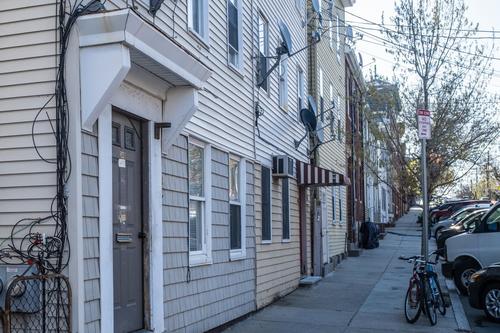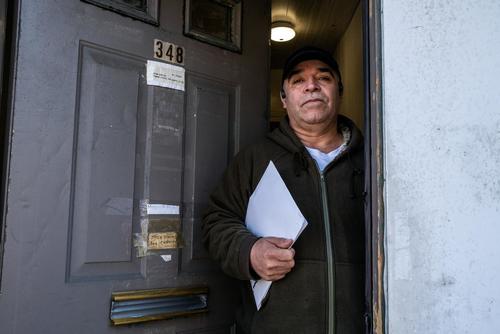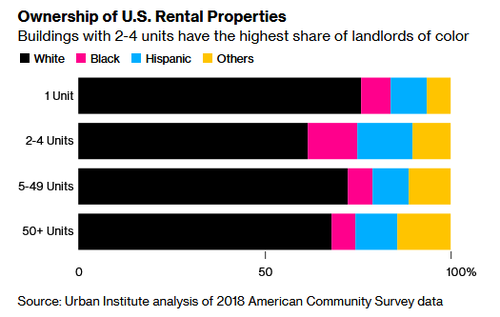
'Mom And Pop' Landlords Dying On The Vine As Un-Evictable Tenants Enjoy Pandemic Protections
ZeroHedge
As millions of renters across America continue to benefit from sweeping protections against eviction during the COVID-19 pandemic, their landlords haven't been so fortunate.

Photographer: Harry Scales/Bloomberg
According to Bloomberg, nearly $47 billion in rent relief from the Biden Administration has been slow to materialize, forcing "mom-and-pop" landlords into financial hardship - or forced to sell to wealthy investors. Bloomberg, perhaps to invoke sympathy for the landlord class, focused on the impact felt by minority landlords.
Like their tenants, these landlords are more likely to be nonwhite or to be immigrants using real estate for their economic foothold. Now, mortgage, maintenance and tax bills are piling up, putting landlords in danger of losing their buildings or being forced to sell to wealthier investors hunting for distressed deals.
...
The tens of billions of dollars that Congress allocated for rent relief -- starting in December and then with a second allotment in March -- was supposed to help by covering back rent and unpaid utility bills. But the rollout has been moving at the speed of bureaucracy, which varies from state to state. -Bloomberg
In one example, airport janitor Joaquin Villanueva has had to take out a home-equity loan to make ends meet while maintaining a three-unit rental house in East Boston. One of his tenants is eight months behind on rent, while another - an unemployed restaurant dish washer, owes him $5,000.

"I don’t want to lose my house so I’m doing whatever I have to do," said Villanueva - an El Salvadorian immigrant who works at Logan International Airport, adding "I’m not rich like a Donald Trump."
Another distressed landlord, Jamaican-America Lincoln Eccles, owns a 14-unit building in the Crown Heights section of Brooklyn, New York. Eccles says investors have been flooding him with unsolicited phone calls, texts and emails. He says that selling would bring much-needed relief, as he's now a year behind on taxes and gas bills. Eccles says he'd rather keep the building acquired by his immigrant father in order to pass it down to his first son, born this month.
Unfortunately for Eccles, "One tenant owes more than $40,000 in back rent, five units are empty and Eccles can’t afford to replace or even fix a boiler that broke down again in March. The rent relief program will help only so much. He’s unlikely to get government grants to cover losses from a tenant who left in November owing $96,000."
According to RealtyTrac Executive VP Rick Sharga, "The fact that we’re over a year into the pandemic really puts a lot of these landlords at risk."
That said, not much is known about how many landlords themselves are in desperate situations, Bloomberg notes, however "it doesn’t take much to fall behind if income stops coming from one tenant in a small building. With each passing month, the problems get bigger and harder to solve."
So what now?
It's going to be an ordeal either way. In order to remedy shortfalls in rent, both renters and landlords will need to cooperate for the landlord's benefit - with local governments often requiring long, detailed applications signed by both parties in order to prevent fraud.
Meanwhile, many landlords don't qualify for federal COVID-19 mortgage forbearance because less than a third have mortgages backed by Fannie Mae, Freddie Mac or another federal agency, while local governments can't afford to let landlords pause property tax payments - particularly in cities which have suffered economic devastation due to the pandemic.
"The long-term concern here, over the course of a few years, is that a growing share of mom and pop landlords will be forced to sell and rents will go up," said Rutgers assistant professor of sociology who researches housing inequality. "There’s a lot of private equity interest and a real possibility of growing consolidation."
From the government side, the situation is a quagmire.
Even as the pace of payments pick up, other challenges are looming. The way Congress allocated the money gave an outsize share to smaller states with low renter populations.
New York’s $2.4 billion portion of the funds, for instance, is expected to cover less than 80% of back rent, utilities and late fees owed in the state as of March, according to estimates from Moody’s Analytics. In Illinois, it’s just 45%. Vermont, however, gets a roughly $350 million allocation, enough to pay for the state’s need more than nine times over.
While Congress provided the Treasury Department with authority to fix any mismatch in funding, the reallocation can’t happen for several more months. -Bloomberg
"Standing up a brand new program like this that’s very high-touch and has to get out ASAP is really tough," said Stockton Williams, executive director of the National Council of State Housing Agencies, who added that while some states - including Alaska, Kentucky and Virginia have been quick to distribute relief, California and Texas - states with large allocations - have been slow to respond but are picking up speed.
Share This Article...
https://www.blacklistednews.com/article/79801/mom-and-pop-landlords-dying-on-the-vine-as-unevictable-tenants-enjoy-pandemic.html

